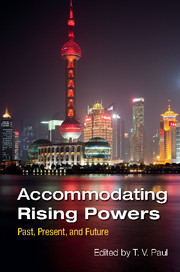Book contents
- Frontmatter
- Contents
- List of figures
- List of contributors
- Acknowledgments
- Part I Mechanisms of accommodation
- Part II Historical cases
- 6 Seizing the day or passing the baton? Power, illusion, and the British Empire
- 7 The US accommodation of Communist China
- 8 Accommodation and containment: Great Britain and Germany prior to the two world wars
- 9 Did the United States and the Allies fail to accommodate Japan in the 1920s and the 1930s?
- Part III Contemporary cases
- Part IV Conclusions
- Index
7 - The US accommodation of Communist China
from Part II - Historical cases
Published online by Cambridge University Press: 05 March 2016
- Frontmatter
- Contents
- List of figures
- List of contributors
- Acknowledgments
- Part I Mechanisms of accommodation
- Part II Historical cases
- 6 Seizing the day or passing the baton? Power, illusion, and the British Empire
- 7 The US accommodation of Communist China
- 8 Accommodation and containment: Great Britain and Germany prior to the two world wars
- 9 Did the United States and the Allies fail to accommodate Japan in the 1920s and the 1930s?
- Part III Contemporary cases
- Part IV Conclusions
- Index
Summary
The admission of the People's Republic of China (PRC) to the United Nations in October 1971 and the concurrent Sino-American rapprochement in the period from 1969 to 1979 suggest that the existing international order was easily capable of accommodating Communist China after more than two decades of international isolation. Under which conditions did this accommodation actually occur? Neither the international organization in New York nor its host country accommodated Communist China because it had become a rising power. In terms of steadily increasing economic or military power, the PRC was neither ascending nor declining in 1971, when it joined the United Nations, nor even in 1979, when it obtained full American diplomatic recognition. Much of the country's meteoric rise happened after these events. How do we explain this case of accommodation, then?
For more than two decades after 1949, the United Nations was the central location both in the American attempt to keep Communist China outside of the global system and in the worldwide movement toward integrating it into the family of nations. The entry of the PRC into the United Nations in October 1971 marked its full accommodation by that international institution; in its wake, Communist China obtained a permanent seat in the Security Council, instantly transforming it into a major stakeholder in global governance. At roughly the same time, however, the PRC obtained only limited accommodation by the United States; bilateral relations did not develop further for another seven years. In fact, the American limited accommodation of Communist China in 1971–72 was largely an attempt to achieve – unsuccessfully – strategic advantages in the Vietnam War (1964–1975), and to accommodate – successfully, at least for a while – the rise of the Soviet Union to strategic parity. Full US accommodation of the PRC at the turn of 1978–79 occurred against the background of domestic developments in China and the bilateral need for cooperative containment of Soviet-supported Vietnamese expansionism in South East Asia.
The motivations for the United States to accommodate Communist China after 1969 rested in the American desire to avoid war in the long term. However, this required the PRC to accept the existing normative world order, that is, the United Nations.
- Type
- Chapter
- Information
- Accommodating Rising PowersPast, Present, and Future, pp. 131 - 149Publisher: Cambridge University PressPrint publication year: 2016



